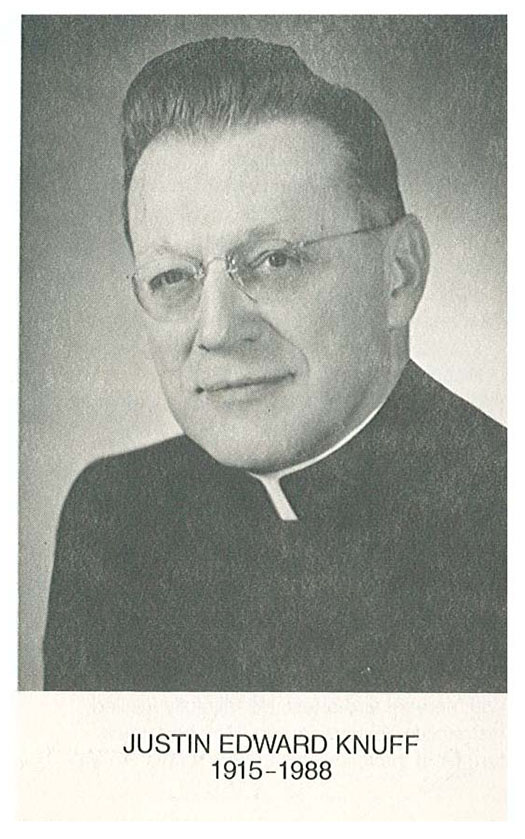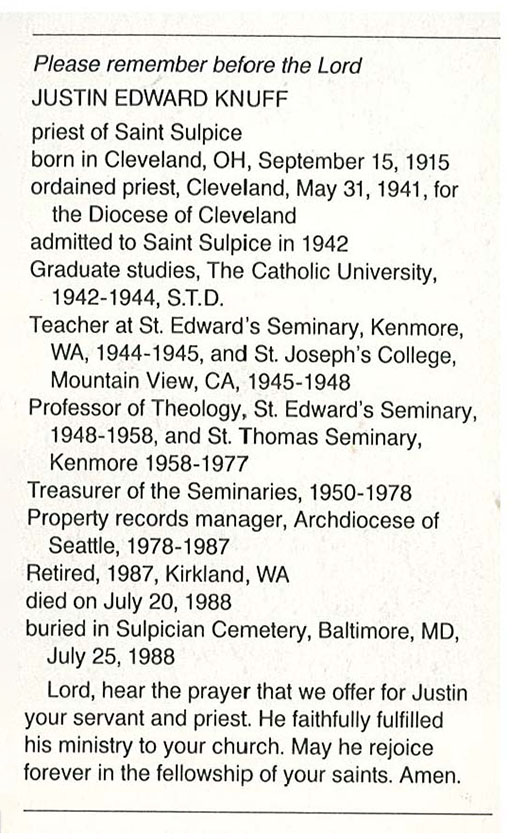Knuff, Father Justin Edward
1988, July 20
Date of Birth: 1915, September 15
August 19, 1988
Dear Confrere:
Our confrere, Justin Edward Knuff, who gave significant continuity to a Sulpician presence in Seattle, Washington, for forty years, died on July 20, 1988, after ten months of serious illness. During most of his priestly ministry there he also gave unusual talent to the management of seminary and church property in the Pacific Northwest.
Justin was born in Cleveland, Ohio, on September 15, 1915, the first son of William Bernard and Rose Mary (Reubelt) Knuff. A daughter, Carmelita, and two other sons, James and William, were also the children of that marriage. Justin’s father was accounts manager for the Republic Steel Corporation, and thus the family home was for a time in Massillon and then Warren, Ohio, depending on the location of the company’s head office. In later years the parents lived in University Heights in suburban Cleveland.
Justin was not quite twelve when he began high school at St. Charles College upon completing his elementary education in seven years at St. Mary’s School in Massillon. His excellent academic record won for him a scholarship at the Basselin College of The Catholic University, where he earned his M.A. in philosophy in 1937. In that same year Bishop Joseph Schrembs of Cleveland released the young seminarian to become an aspirant to the Society of St. Sulpice, and Justin continued in residence at the Sulpician Seminary (Theological College) while taking his theological studies at the University. He was in the first class that took all its courses on that campus rather than in the Seminary. He served as student master of ceremonies and earned his S.T.L. degree just prior to his ordination to the priesthood in Cleveland on May 31, 1941.
Father Knuff was to continue at the University for doctoral studies, but an opening occurred in the Sulpician formation year program, which took place that year for the first time at St. Mary’s Seminary, Paca Street. The following summer he was admitted to the Society and began work on his doctoral dissertation. In 1944, he received his S.T.D. and was assigned to St. Edward’s Seminary in Seattle to teach high school English, Latin, and religion, almost simultaneously with the call of his two younger brothers to war-time military service. It was a difficult time for their parents to have all three sons so far distant from home. The following summer Father Knuff was asked to transfer to St. Joseph’s College in Mountain View to fill a teaching vacancy in similar courses.
Father Knuff’s chance to teach in his doctoral field came in 1948 when a faculty member in Settle became ill. He began with moral theology, the Eucharist course, and liturgy, and also became the master of ceremonies for the Seminary, which included numerous liturgical ceremonies at St. James Cathedral.
The following year, to his considerable shock, the provincial council asked him to take on the duties of treasurer at St. Edward’s. It was a difficult assignment because there was hardly a time when finances were not a big challenge at the Seattle seminary. Tuition income never covered costs and endowment funds were hard to attract. By skillful management, nevertheless, Father Knuff brightened the fiscal situation considerably and, after the Archdiocese agreed to meet the annual deficit, the stressful situation eased for a few years. Enrollment grew at such an encouraging pace that plans were developed by the Archdiocese for a separate major seminary, and St. Thomas Seminary opened on the same property in 1958. The following year Father Knuff’s father died in Warren after several years of illness, which had begun soon after his wife’s death. Four years later, Father Knuff’s younger brother, William, died.
As a member of the theology faculty, Father Knuff naturally moved to the new seminary. For most of his years in Seattle up to 1966, he served as faculty secretary and from 1967 he served for several years as the vestiaire for the Seattle Sulpicians. While St. Thomas Seminary had a spartan institutional character for the most part, it also had a carefully designed use of interior space that was a vast improvement over the layout of earlier seminaries built by Sulpicians. One feature it included, however, was the effective separation of the treasurer’s office and living quarters from most seminary activities. On hindsight this arrangement no doubt contributed to a gradual removal of Father Knuff from the life of the student community, although he kept up his gracious ways with fellow faculty members. He celebrated his daily Mass with the sisters who staffed the kitchen and dining room until they withdrew from Seattle in 1973, and, in 1970, he gave up his classroom teaching. Through all his years in the Northwest, he kept up a close relationship with his sister and brother and other family members. His closest friends in Seattle were mostly from the business and professional community who had contact with the Seminary. These people provided him with a welcome and needed break from the stress of balancing budgets and supervising staff in a time of now declining enrollment, conflicting opinions about priestly formation in a post-Vatican II church, and adaptation to multiple uses of the property, notably the locating of a new parish that shared a portion of the facilities.
The closing of St. Edward’s in 1976 and St. Thomas Seminary in 1977 had been foreseen by Father Knuff as probably inevitable, but it was nonetheless very painful for one who had been so intimately involved with the development and maintenance of that magnificent lakeshore property for twenty-eight years. He managed the property for another year, while in early 1978 accepting a part-time position with the Archdiocese as property records manager. He also found an apartment in nearby Kirkland which provided a modestly comfortable living situation.
Father Knuff’s health began to deteriorate in 1981 with a chronic obstructional lung disease. He was urged to move to a retirement facility where proper care could be assured, but his roots were too deep in Seattle and he treasured his independent living. Even as his health worsened, he postponed his plans to move to his sister’s or brother’s home. When floored by a stroke early this year, he acknowledged that he had thought such an event would never happen to him. In his last months he received loving care in a convalescent center, even while he hoped he might return to his former routine.
Father Knuff died in Kirkland and a Mass of Christian burial was celebrated on July 22 by Archbishops Raymond G. Hunthausen and Thomas J. Murphy and numerous priests in the Church of St. John Mary Vianney, the former chapel of St. Thomas Seminary. The homily was preached by the Rev. Roger O’Brien, pastor of St. Luke’s Church and Father Knuff’s former student and Sulpician colleague. Another Mass was celebrated on July 25 in Our Lady of the Angels Chapel at the Charlestown Retirement Community in Baltimore. The Rev. Raymond F. Hesler, S.S., was principal celebrant. The homily was given by the Rev. James H. Brennan, S.S. Rev. Thomas R. Hurst, S.S., led graveside prayers at the Sulpician cemetery.
Father Knuff is survived by his sister, Mrs. Joseph P. (Carmelita) O’Hara, his brother, John, and two nieces and three nephews.
May Father Knuff live forever in the joy of the Resurrection.
Sincerely yours in Christ,
William J. Lee, S.S.
Provincial Secretary


